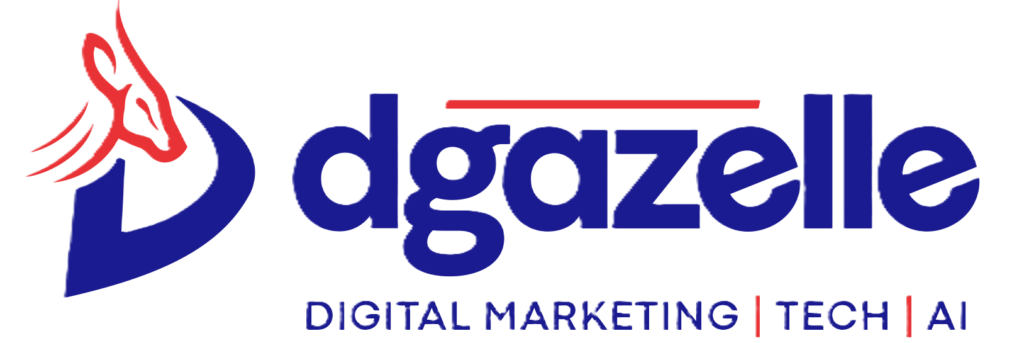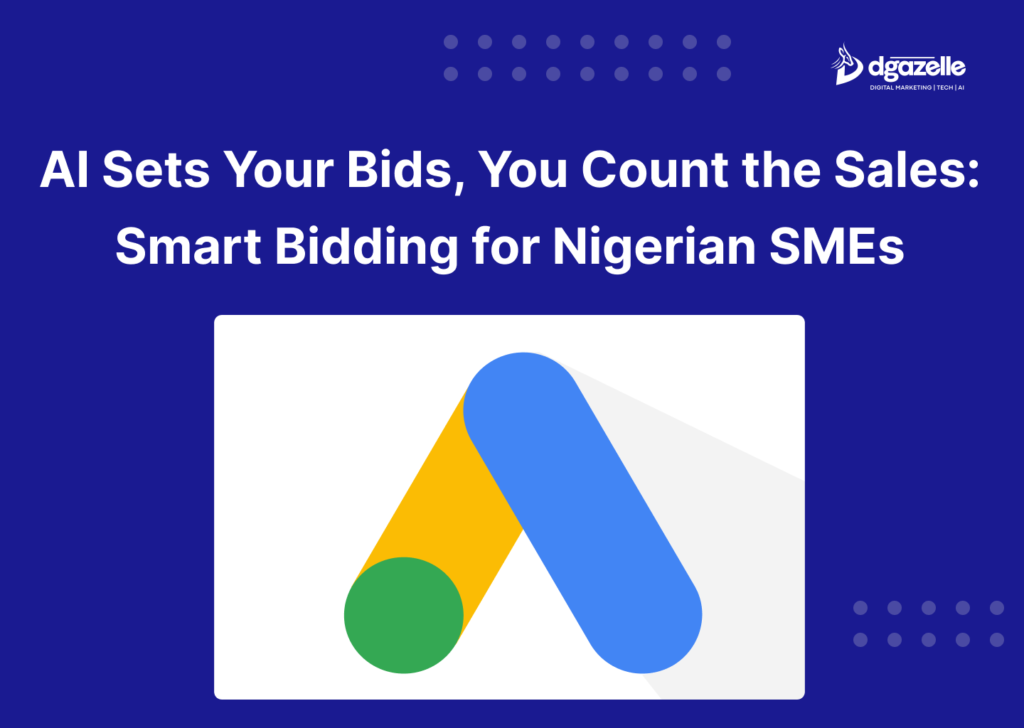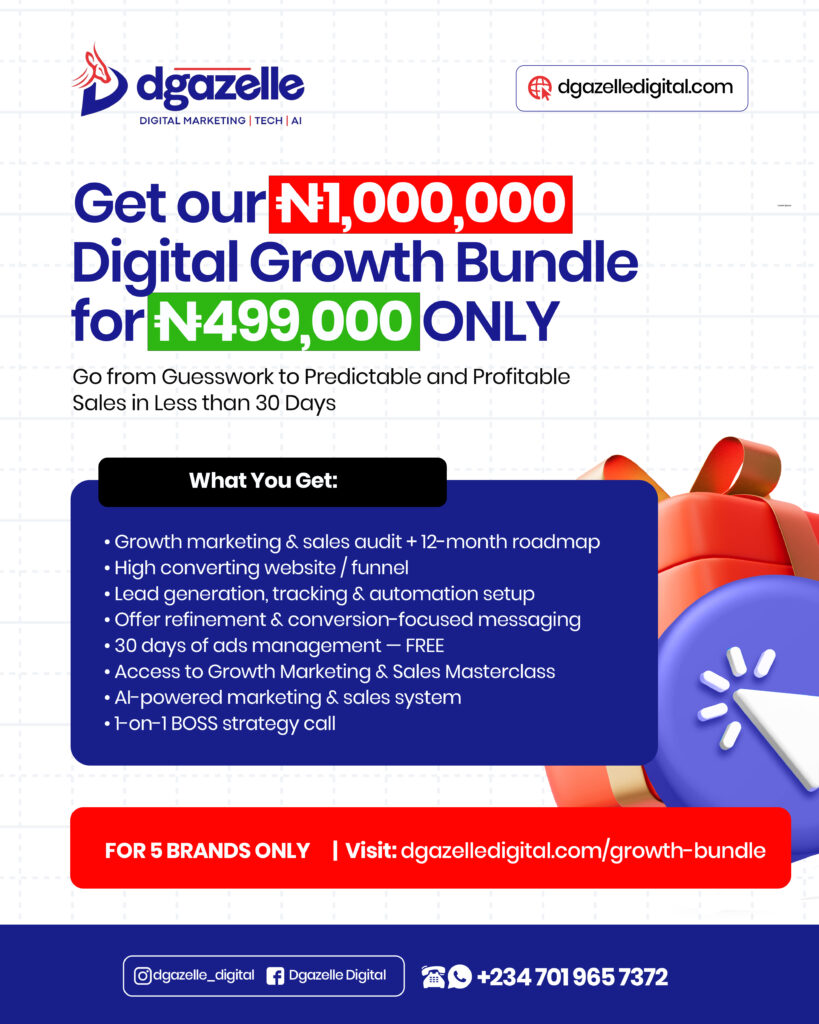Google Ads Smart Bidding transforms the time-consuming and unpredictable nature of manual bidding by leveraging AI technology to automate real-time bid adjustments, eliminating the guesswork of traditional campaign management while analyzing extensive data points including user behavior, device type, time of day, and past interactions to optimize ad spend and maximize conversions—a significant improvement for advertisers who have struggled with the inefficiencies of manually tweaking bids and monitoring performance to stretch their marketing budgets.
For instance, let’s say you own an e-commerce store selling sneakers. With manual bidding, you might set a fixed bid of ₦800 for the keyword “running shoes in Lagos.” But Smart Bidding might automatically raise your bid to ₦1,200 at 7 PM when data suggests more buyers are actively searching, increasing your chances of making a sale.
Whether you run a small business or a fast-growing startup, leveraging AI-driven bidding can help you scale your ads more efficiently—and that’s where Dgazelle comes in.
We not only help businesses optimize their digital ads but also ensure their websites are designed to convert traffic into paying customers. Because what’s the point of driving clicks if your website isn’t built to convert?
How Smart Bidding Works
Google Smart Bidding takes the guesswork out of bid management by using AI to analyze vast amounts of data and optimize bids in real-time. Instead of manually adjusting your bids, the system evaluates multiple factors to determine the most effective bid for every auction. This ensures you’re always bidding strategically, maximizing your ad spend without constant monitoring.
Here’s how Smart Bidding fine-tunes your bids:
- User Intent: Google assesses what the user is searching for and matches it with your business goals. For instance, a user searching for “best accounting software for SMEs in Nigeria” is likely closer to converting than someone just searching for “business software.”
- Time of Day: Your audience may be more active at certain hours. Smart Bidding adjusts bids accordingly, ensuring you capture leads at peak times.
- Location: If data shows your highest conversions come from Lagos and Abuja, Smart Bidding prioritizes bids in these regions.
- Device Type: If mobile users convert better than desktop users, bids for mobile searches may be increased automatically.
By leveraging these real-time signals, Google Ads ensures your campaigns remain adaptive and data-driven, optimizing every naira you invest.
Competitive Advantage of Smart Bidding?
Google Ads Smart Bidding is a game-changer for Nigerian business owners looking to improve their return on investment (ROI) and reduce manual ad management. Whether you’re running an e-commerce store, a service-based business, or a local brand, Smart Bidding helps maximize your advertising efforts with AI-powered precision. Here’s why it’s worth considering:
1. Optimized Bid Adjustments
With Smart Bidding, bid optimization happens in real-time, ensuring that your ads reach the right audience at the right moment. The AI evaluates user behavior, search intent, device type, location, and even the time of day, making automatic adjustments to increase your chances of conversion.
2. Improved ROI
Smart Bidding doesn’t just spend—it invests every naira where it matters most. Brands that use automated bidding have seen drastic improvements. For example, OLX experienced an 89% increase in conversions while cutting cost per conversion by 32%. That’s the kind of efficiency that translates into more leads and higher sales for your business.
3. Time Savings
Manually tweaking bids can be exhausting. Smart Bidding automates the entire process, freeing you up to focus on strategy, content, and customer experience. If you’re running multiple campaigns, automation ensures your ads are performing at their best without constant monitoring.
4. Customizable to Your Business Goals
Whether you’re aiming to maximize conversions, achieve a specific cost per acquisition (CPA), or optimize return on ad spend (ROAS), Smart Bidding aligns with your objectives. You set the goal, and Google’s machine learning takes care of the rest.
5. Proven Results Across Industries
Businesses across different sectors are already benefiting from Smart Bidding. For example, Goibibo reported a 25% increase in hotel transactions and a 22% lower cost per conversion after making the switch. These results show that when implemented correctly, Smart Bidding is a powerful tool for driving growth.
Smart Bidding is just one piece of the puzzle—your website needs to be optimized to convert the traffic you bring in. At Dgazelle, we help businesses build high-converting websites that turn ad clicks into real customers. Let’s optimize your online presence today—contact us to get started!
How to Get Started with Smart Bidding
Smart Bidding may seem advanced, but getting started is easier than you think. With the right setup, you can automate your Google Ads campaigns and let AI handle bid adjustments while you focus on growing your business. Follow these four steps to integrate Smart Bidding into your marketing strategy.
Step 1: Set Up Your Google Ads Account
Before enabling Smart Bidding, ensure your Google Ads account is properly configured. Here’s what you need to do:
- Enable conversion tracking to allow Smart Bidding to analyze performance data.
- Define your conversion actions, such as form submissions, purchases, or calls.
- Structure your campaigns logically based on product categories, services, or customer intent.
- Ensure you have at least 30 conversions in the past 30 days to provide enough data for optimization.
The more accurate and structured your data, the better your results will be.
Step 2: Choose the Right Bidding Strategy
Your bidding strategy should align with your business objectives. Here are the four main Smart Bidding strategies:
- Maximize Conversions: Best for businesses aiming to get as many conversions as possible within their budget.
- Target CPA (Cost Per Acquisition): Ideal if you want to maintain a specific cost per conversion.
- Maximize Conversion Value: Focuses on revenue rather than just conversion numbers.
- Target ROAS (Return on Ad Spend): Helps businesses aiming for a specific return on their advertising investment.
To enable Smart Bidding, navigate to your campaign settings, click on “Bidding,” then choose “Change bid strategy” and select the one that fits your goals.
Step 3: Run an A/B Test to Validate Your Strategy
Before fully committing, it’s wise to test Smart Bidding against your current approach. Follow these steps:
- Go to “Drafts & Experiments” in Google Ads.
- Create a new experiment comparing Smart Bidding to your existing bid strategy.
- Let the test run for at least two weeks to gather enough data.
- Analyze results to determine if Smart Bidding delivers better conversions and ROI.
Testing allows you to fine-tune your strategy before fully switching over.
Step 4: Monitor and Optimize Your Campaign Performance
Once Smart Bidding is live, keep an eye on its performance. Use Google’s Bid Strategy Report to track key metrics like:
- Conversions and conversion rate to measure effectiveness.
- Cost per conversion to ensure efficient spending.
- ROAS (Return on Ad Spend) to evaluate revenue growth relative to ad spend.
To access your bid strategy performance, go to “Tools & Settings” > “Shared Library” > “Bid Strategies” in Google Ads. Smart Bidding typically improves over time as it gathers more data, so allow a few weeks before making major adjustments.
Conclusion
AI can analyze vast amounts of data and optimize bids in real-time, but it lacks the strategic insight needed to make informed business decisions. It doesn’t understand your brand voice, long-term objectives, or the unique nuances of your market. That’s where human oversight comes in.
By combining AI’s efficiency with your strategic thinking, you can fine-tune PPC ad copy, refine targeting, and adjust campaigns based on real-world insights. Let Smart Bidding handle the numbers, but use your expertise to steer the strategy. The best results come from blending automation with human judgment.
Let AI handle the bids while you focus on growing your business. Optimize your ad strategy with expert-backed automation. Get started with Dgazelle today!







